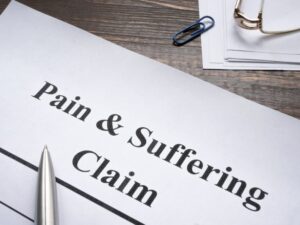When you suffer an injury due to someone else's negligence, you may recover substantial compensation for your pain and suffering. While no exact formula can calculate these damages, a few factors can help determine a fair amount.
Your pain and suffering damages depend on your injury and whether you can successfully tell your story in the claims or lawsuit process.
Insurance companies will try their own way of doing things, which can result in an underpayment of your damages.
You need to fight back to get paid for the effects that your physical injuries have had on you. You may even need to file a personal injury lawsuit to recover the full compensation you deserve.
To have the best chance of recovering all the money that you deserve after your accident, contact a Killeen personal injury attorney. Your lawyer will calculate what you should get, and they will present it to either the insurance company or the court. This calculation will fully factor in your situation.
Then, your personal injury lawyer will either negotiate for you to receive a full settlement check or they will detail your circumstances to a jury. The hope is that you will receive money for all your pain and suffering.
Get help from a personal injury attorney whenever you have suffered an injury in an accident that was someone else’s fault. Your personal injury lawyer will gather proof that can show that someone else was at fault for what happened, while they will also calculate how much compensation you should receive.
If you do not have legal representation yet, contact an attorney as soon as possible. Getting a personal injury attorney in your corner costs nothing from your pocket.
What Is Pain and Suffering?

Pain and suffering damages refer to the physical and emotional distress you experience due to an injury, including physical pain, mental anguish, emotional distress, and loss of enjoyment of life.
When you suffer physical injuries in an accident, they will have many impacts on your life. Physical injuries do not occur in a vacuum, and for every physical injury that you suffer, you may need to deal with numerous effects for some time to come.
Of course, you will feel physical pain from your injuries that can complicate your daily life and make things harder on you.
The effect of the physical pain may lead to other difficulties, such as:
- Anxiety
- Depression
- Changes in your mood
- Difficulty sleeping
Pain and suffering encompass even more challenges and difficulties. For example, you may no longer live the life you did before the accident. Loss of enjoyment of life is a part of your pain and suffering damages.
In addition, your physical injuries may leave you feeling embarrassed and humiliated. The change in your appearance and needing help with certain basic activities can hurt your mental health.
When you can prove that someone else was to blame for your accident injuries, they must pay you for your economic losses and compensate you for things like pain and suffering.
The key is knowing how much your case is worth before you seek compensation, and you will do that with the help of an experienced personal injury attorney.
Pain and Suffering Damages Account for Your Situation
No two accident victims will suffer the same pain and suffering damages from their injury.
An injury such as a broken leg can affect people differently. One may lead an active and athletic lifestyle, and they will miss physical pursuits such as running and competitive sports. Another may be more prone to depression, causing more serious mental health effects from the injury.
Do not assume your situation mirrors someone else who may have entirely different circumstances. Pain and suffering damages are individualized considerations, no matter what the insurance company tries to tell you.
What Are the Challenges of Receiving Compensation for Pain and Suffering?
When you claim damages for pain and suffering, you report what you have experienced personally since your injury.
By definition, pain and suffering damages are inherently subjective, and you are relaying your personal experience to receive compensation. Insurance companies want to see things right in front of them in black and white because they know that anything subjective can cost them more money.
You are attempting to persuade insurance companies about your mental health and personal life while they are trying to curb their liability.
Further, pain and suffering damages measure both what you have been through and what you will experience in the future. While it is easier to relate what you have already experienced, it is more challenging to know what the future holds for you.
Differences of opinion may form about how your expected medical condition will affect your life. Your personal injury attorney may work with medical experts to learn how your injuries will affect you.
The burden of proof is on you to show your damages, so you need a lawyer to present a compelling account, especially if you must litigate your case in court.
How Does the Insurance Company Try to Calculate Pain and Suffering?
Insurance companies have their own motivations in your case. When they realize they need to pay for your damages, insurance companies will do everything possible to limit the money they must pay you.
They will immediately try to take the subjective elements out of your case to the fullest extent possible, telling you they are using objective calculations”to determine your pain and suffering damages. But any financial calculation insurance companies use will benefit them, not you, so let your lawyer validate anything they say.
The Multiplier Method for Calculating Pain and Suffering
The multiplier method is the primary means of calculation that insurance companies use for pain and suffering damages. They will use this formula when you have suffered an injury that may remain with you for an extended period.
Here, everything begins with your medical expenses, both past and future. Insurance companies will review the necessary care to treat your condition and select a multiplier for these medical costs.
The multiplier that they choose depends on the severity of your injury.
For example, if you have suffered severe effects, such as a traumatic brain injury or a spinal cord injury, the multiplier is higher. If you have suffered a less severe injury, such as damage to a soft tissue, the multiplier may decrease.
The multiplier times your medical expenses will equal your pain and suffering damages.
The Per Diem Method for Pain and Suffering

Insurance companies will select a different method to calculate your damages if you have suffered an injury from which you will recover within a finite amount of time.
Here, they use the per diem method, assigning a specific dollar amount per day for pain and suffering damages you will suffer. Then, insurance companies will estimate how long it will take you to recover from your injuries.
They will multiply the number of days by the dollar value to arrive at the pain and suffering damages that they offer you.
Insurance companies may use this method for something like a cartilage tear or fracture that you will fully recover from within a set amount of time.
What Can I Do to Maximize My Pain and Suffering Damages?
There are things that you can do to help get yourself as much money as possible for pain and suffering damages.
First, document your condition to the fullest extent possible. Even if your documentation is subjective, contemporaneous notes may be more persuasive to the insurance company when they see your claim.
Consider keeping a daily journal of the experiences you are going through to present your claim or to have it ready in case you need it.
You may also rely on witness testimony from people who have seen you since the injury. You will use this testimony if your case goes to trial, and you must prove your damages. The more you document and verify, the more persuasive a case you can present.
The most important step that you can take to maximize the value of your case is to hire a personal injury attorney to represent you in the legal process. You likely have no way of knowing how much you can expect in damages, let alone something as subjective as pain and suffering. Then, you may risk taking whatever the insurance company offers you, even if the figure is nowhere close to what you deserve.
When you hire a personal injury lawyer, they can review your situation. They understand the law and how a jury may look at your pain and suffering should your case go to court. Your personal injury attorney will form an estimate of your damages to present as part of your claim or lawsuit.
The Insurance Company Cannot Dictate Your Pain and Suffering Compensation

Insurance companies are not in a position where they can conclusively determine anything in your case, and they do not have the power to impose a settlement agreement on you.
They can make you an offer that includes their estimate of your pain and suffering damages, but it is important to know that they are presenting it for your consideration. If the offer and their estimate of your pain and suffering damages are too low, you can reject it.
Like everything else in a personal injury claim, pain and suffering damages are up for negotiation in the claims or lawsuit process. Insurance companies may have to raise their initial offer if they do not want to have to litigate your case in court.
Your personal injury attorney can negotiate a settlement on your behalf, regardless of whether you have filed a claim or lawsuit. Legal pressure can force insurance companies to raise their offer to the point where it may make sense for you to accept it.
Otherwise, you can always take your case to a jury, which is an outcome that the insurance company fears. The jury may not use the insurance company's formulas, and you may receive more compensation than you would have gotten in the claims process.
Ultimately, the threat of litigation is your trump card when you are trying to negotiate compensation with insurance companies. They want to avoid paying the expenses of a lawsuit and certainly do not want to surrender control of the case to a jury.
When you hire an experienced personal injury attorney with a track record of delivering results inside and outside the courtroom, insurance companies will get the message that you mean business in the claims process.
It Costs You Nothing Out of Pocket to Hire a Personal Injury Attorney
A significant concern that many people have when considering hiring an attorney is the financial burden. You may worry about how you will afford legal fees, especially if you are already dealing with medical bills and other expenses related to your accident.
However, personal injury lawyers typically work on a contingency fee basis, meaning you do not have to pay any upfront or out-of-pocket fees to hire their services.
Instead, their fee depends on the compensation they recover for you, and they will receive an agreed-on percentage of your settlement or jury award. You will not owe them a legal fee if they do not win your case.
This arrangement also means you can have peace of mind knowing that your attorney is working on your behalf without adding additional financial strain.
Personal Injury Attorney is Standing By
Calculating pain and suffering damages is a complex process that requires experience and legal knowledge.
Hiring a personal injury lawyer will increase the likelihood of obtaining the compensation you deserve. They have the knowledge, resources, and negotiation skills to accurately assess the value of your claim and advocate for your best interests.
Consult an experienced personal injury attorney who can guide you through the legal process and help you get your life back on track.
